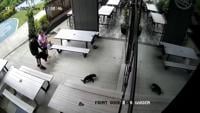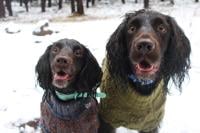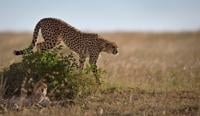It’s normal for parents, or anyone, to have questions about vaccinations -- but what happens if your pediatrician urges a shot that’s under at…
TOKYO (AP) — Japan was assessing damage Tuesday and cautioning people of potential aftershocks after a late-night 7.5 magnitude earthquake cau…
CHENGDU, China (AP) — French first lady Brigitte Macron caught up with an old friend — a giant panda born in France — at the tail end Friday o…
MORRO BAY, Calif. (AP) — On a jagged coastline in Central California, brown pelicans gather on rock promontories, packed in like edgy commuter…
WELLINGTON, New Zealand (AP) — A seal walked into a bar. Or to use a technical term, it galumphed.
Two English Cocker Spaniel dogs, Roo, left, and Ryder, stand in the snow wearing sweaters to keep them warm during the first snow of the season in Flagstaff, Ariz., Wednesday, Nov. 19, 2025. (AP Photo/Cheyanne Mumphrey)
CAPE TOWN, South Africa (AP) — For 35 years, American zoologist Laurie Marker has been collecting and storing specimens in a cheetah sperm ban…
FILE - A cheetah descends from on top of a mound in the savannah of the Maasai Mara, Kenya, July 6, 2015. (AP Photo/Ben Curtis, File)
Protesters gather at a rally for immigrant and worker outside Signature Aviation near the Minneapolis–Saint Paul International Airport, Wednesday, Dec 3, 2025, in Minneapolis. (AP Photo/Tom Baker)
Protesters gather at a rally for immigrant and worker outside Signature Aviation near the Minneapolis–Saint Paul International Airport, Wednesday, Dec 3, 2025, in Minneapolis. (AP Photo/Tom Baker)
















